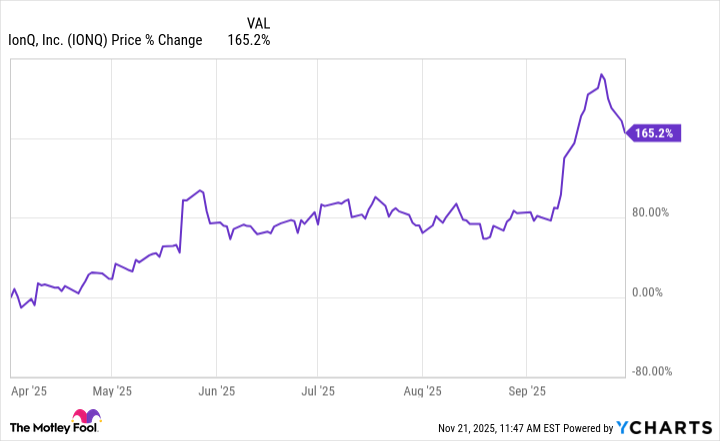Following the end of each calendar quarter, institutional money managers with over $100 million invested in stocks are required to file a document called a 13F with the Securities and Exchange Commission (SEC). A form 13F itemizes each stock a fund bought and sold during the most recent quarter. What investors might not realize, however, is that corporations also use some of their excess cash to build their own portfolios. As such, businesses may be required to file a 13F, too.
During the third quarter, e-commerce and cloud computing giant Amazon (AMZN +0.50%) revealed in its 13F filing that it has sold its entire position in quantum computing stock IonQ (IONQ 2.00%).
Let's break down the mechanics of Amazon's trade and assess why the company may have moved on from IonQ.

Image source: Getty Images.
When did Amazon invest in IonQ?
According to Amazon's filings, the company initially purchased 854,207 shares of IonQ during the second quarter.
In my eyes, the investment was strategic. IonQ's trapped ion technology can integrate with Amazon Bracket, a service within the broader Amazon Web Services (AWS) ecosystem.
Given IonQ's integrations with other leading cloud providers -- namely Microsoft Azure and Google Cloud Platform (GCP) -- Amazon may have viewed an investment as a means to form a strategic partnership with the quantum computing pure play and gain an advantage over other hyperscalers exploring the technology.
The likely reason Amazon dumped its stake in IonQ
Between April 1 and Sept. 30 -- the beginning of Q2 and end of Q3 -- shares of IonQ soared 165%. While it's hard to know exactly when Amazon purchased shares of IonQ during the second quarter, the trends below indicate that the company was sitting on a big gain.
Data by YCharts.
I think Amazon decided to use IonQ's momentum to its advantage and take profits off the table. The deeper question is why Amazon may have done this just one quarter after initiating a position in IonQ.
To me, it all boils down to priorities. At the moment, Amazon's main focus in the artificial intelligence (AI) realm revolves around continued infrastructure investments in the form of data center buildouts as well as custom silicon designs.
Although Amazon does have its own custom quantum computing chip, called Ocelot, this technology does not appear to be a primary catalyst for the company in the near term.
While Amazon's stake in IonQ was only worth around $37 million -- essentially a rounding error for the company's $728 billion balance sheet -- it signals how deliberate Amazon is with regard to capital allocation for its AI roadmap.
Moreover, should a speculative stock like IonQ begin to plummet, then Amazon wouldn't have the luxury of using its newfound gains to help fund more strategic, higher return on investment projects.
At the end of the day, cashing out its IonQ position looks incredibly savvy for Amazon.
Is IonQ stock still a buy?
While the idea of quantum computing is interesting, the technology itself remains more exploratory than commercially viable at this time. IonQ, for its part, has largely become a favorite within the retail investor community -- trading more on narratives and headlines than actual business progress.

NYSE: IONQ
Key Data Points
For now, IonQ's growth profile is tough to gauge as the company has spent billions on acquisitions to fund its product roadmap. Against this backdrop, the expected financial contributions of true organic growth and the newly acquired assets are unclear.
In addition, IonQ's price-to-sales (P/S) multiple of 191 is unsustainably -- and almost comically -- high. At the moment, IonQ's valuation ratios are far above what investors saw during prior bubbles such as the dot-com boom.
History shows that whenever a megatrend or highly engaged stock market theme becomes too bloated, valuation multiples first become stretched and then eventually come crashing down. This phenomenon is known as a stock market bubble bursting.
While IonQ is involved in an intriguing chapter within the broader AI narrative, I am not sold that the company has the technological prowess or capital allocation discipline to reach enterprise scale in the long run.
For all of these reasons, I do not see IonQ as a smart buy right now.







